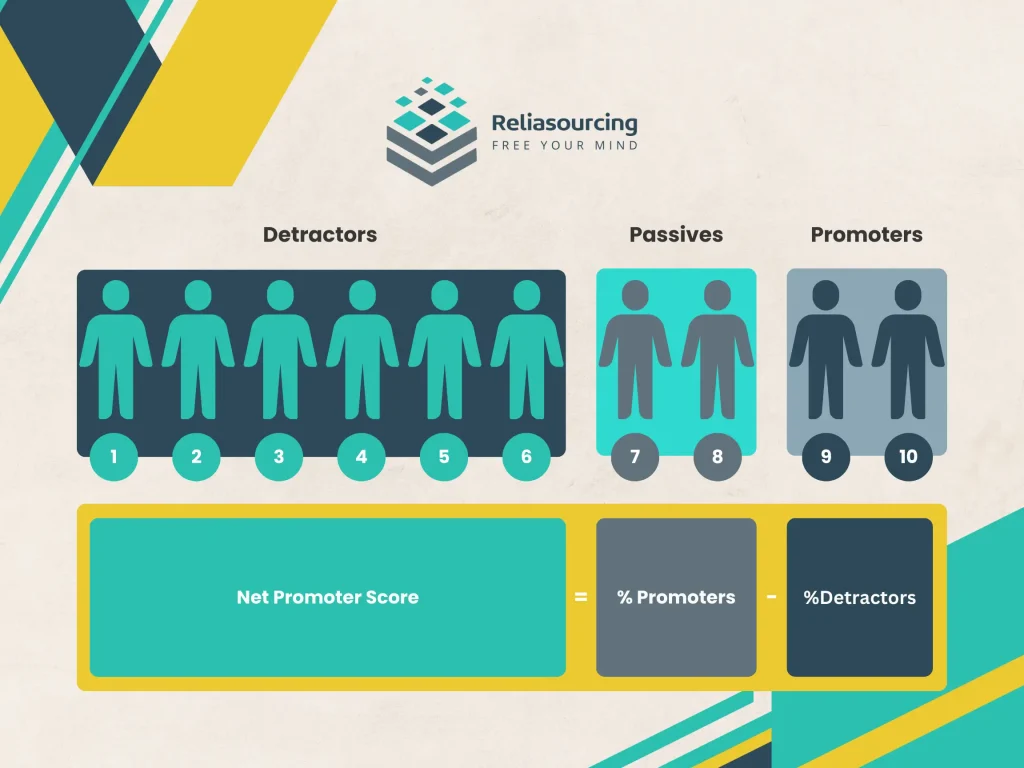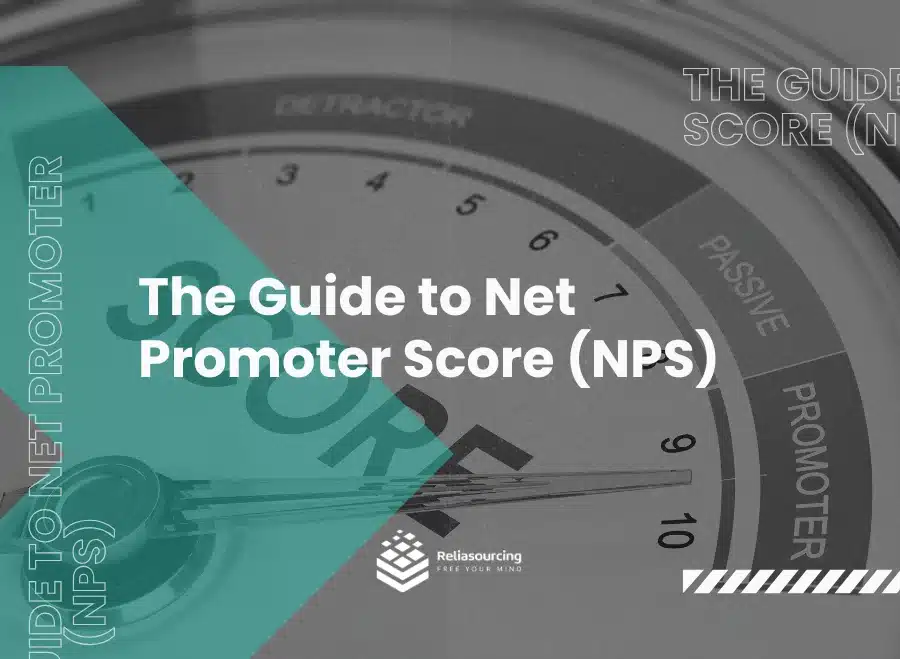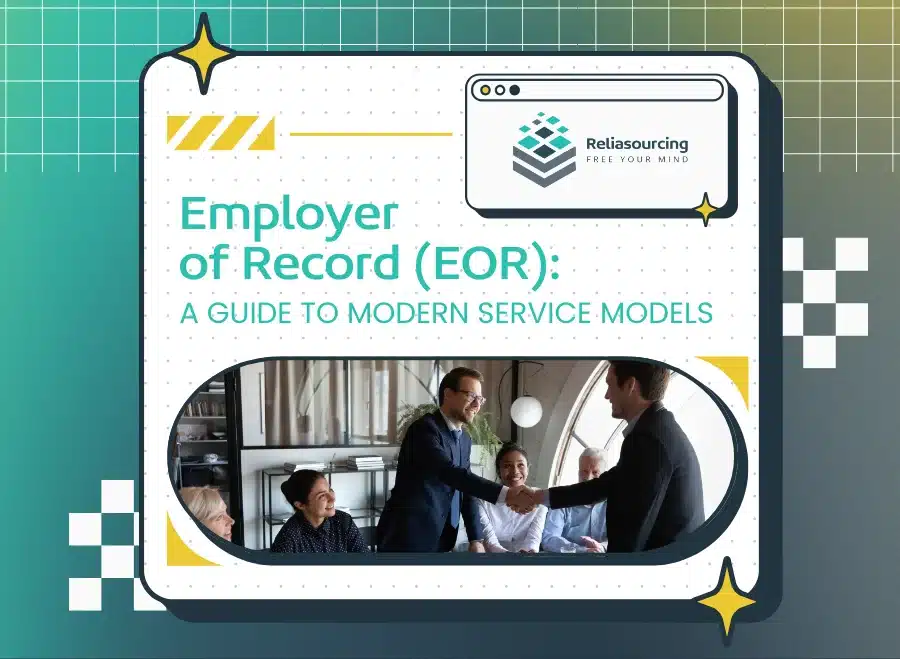Customer loyalty and satisfaction are critical to the success of any business. Measuring these aspects effectively can provide valuable insights into customer perceptions and help guide strategic decisions. One powerful tool for gauging customer loyalty is the Net Promoter Score (NPS).
This guide will walk you through what NPS is, its importance, how to calculate and implement it, and how Reliasourcing can help optimize your customer success efforts through NPS.
What is Net Promoter Score?
Companies widely use Net Promoter Score (NPS) to assess customer loyalty and satisfaction, gaining valuable insights into customer relationships. Developed by Bain & Company, NPS is based on a single, straightforward question: “On a scale from 0 to 10, how likely are you to recommend this product/company to a friend or colleague?”

The responses to this question are used to categorize customers into three distinct groups:
- Promoters (Score of 9-10)
Promoters are highly enthusiastic and loyal customers. They are not only satisfied with your product or service but are also likely to act as advocates for your brand. These customers contribute significantly to business growth through positive word-of-mouth, referrals, and repeat purchases. Their loyalty and willingness to recommend your brand help drive new customer acquisition and enhance the overall brand reputation. - Passives (Score of 7-8)
Passives are satisfied but not overly enthusiastic customers. While they do not actively promote your brand, they are also not likely to spread negative feedback. However, they are vulnerable to competitive offerings and may switch to a competitor if they find a better deal or experience. Understanding the needs and concerns of passive customers can help you convert them into promoters by improving your offerings and customer experience. - Detractors (Score of 0-6)
Detractors are dissatisfied customers who can harm your brand through negative word-of-mouth. They are less likely to continue doing business with you and more likely to discourage others from becoming your customers. Addressing the issues and concerns of detractors is crucial to improving your overall customer satisfaction and loyalty. By identifying common pain points and taking corrective actions, you can mitigate the negative impact on your brand and potentially turn detractors into satisfied customers.
Why is Net Promoter Score Important?
NPS is crucial because it serves as a predictor of business growth. High NPS scores typically indicate strong customer loyalty and positive word-of-mouth referrals, which are essential for sustainable growth. Here are several reasons why NPS is important:
- Benchmarking: NPS allows you to compare your performance against industry standards and competitors.
- Customer Insight: By understanding why customers score the way they do, you can identify areas for improvement.
- Goal Alignment: Rallying your team around a common goal of improving NPS can unify efforts across departments.
- Customer Retention: Identifying detractors and addressing their concerns can improve retention rates.
How is Net Promoter Score Calculated?
Calculating Net Promoter Score (NPS) is a straightforward process that provides valuable insights into customer loyalty and satisfaction. Here’s an in-depth look at each step involved in the calculation:
- Survey Your Customers
The first step in calculating NPS is to survey your customers. The core question you need to ask is: “On a scale from 0 to 10, how likely are you to recommend this product/company to a friend or colleague?” This question is crucial because it directly measures the likelihood of referral, which is a strong indicator of customer loyalty. - Categorize Responses
Once you have collected the responses, categorize them into three groups based on the score each customer gives:
Promoters (9-10): These are your most satisfied and loyal customers who are likely to recommend your product or service to others.
Passives (7-8): These customers are satisfied but not enthusiastic enough to be considered promoters. They are neutral and could be swayed by competitors.
Detractors (0-6): These are unsatisfied customers who are unlikely to recommend your product or service and might even discourage others from using it. - Calculate the Score
To calculate the NPS, follow these steps:
1. Calculate the percentage of promoters: Divide the number of promoters by the total number of respondents and multiply by 100.
2. Calculate the percentage of detractors: Similarly, divide the number of detractors by the total number of respondents and multiply by 100.
3. Subtract the percentage of detractors from the percentage of promoters: This difference gives you the NPS.
Importance of NPS Calculation
Understanding the NPS calculation helps businesses identify their most loyal customers (promoters) and those at risk of leaving (detractors). Converting passives into promoters and addressing the concerns of detractors businesses can improve overall customer satisfaction and drive growth.
What is a Good Net Promoter Score?
Interpreting NPS can vary by industry. Generally, any score above 0 is considered good, as it indicates more promoters than detractors. A score of 50 or more is excellent, while 70 and above is exceptional. Industry benchmarks provide additional context; for instance, in 2025, tech giants like Netflix and Amazon often score above 50, reflecting high customer satisfaction.
Interpreting Net Promoter Scores (NPS) in 2026
Determining what constitutes a “good” Net Promoter Score (NPS) can vary significantly across different industries. Here’s a detailed look at what these scores mean and how they apply to companies focusing on data in 2026:
General Benchmarks for NPS
- Above 0: Any score above 0 indicates that a company has more promoters than detractors, which is a positive sign.
- Above 20: Scores in this range are generally considered good, showing a solid level of customer satisfaction.
- Above 50: A score of 50 or more is excellent, suggesting a high level of customer loyalty and satisfaction.
- Above 70: Scores of 70 and above are exceptional, representing companies with very loyal customers who are likely to recommend their products or services to others.
Industry-Specific Context
The context of the industry is crucial in interpreting NPS:
- Technology Sector: Tech giants such as Netflix and Amazon often score above 50, reflecting their strong customer satisfaction and loyalty.
- Service Industry: For service-oriented companies, a score above 30 can be considered good, with scores above 50 being outstanding.
- Healthcare and Financial Services: These sectors typically see lower NPS benchmarks due to the nature of their services, so a score above 20 is often seen as positive.
Data-Focused Companies in 2026
For companies focusing on data and analytics, having a high NPS is critical as it reflects customer trust and satisfaction with data services and products:
- Data Integrity and Security: Companies providing data services need to score high on NPS to assure clients of their reliability and security.
- Customer Experience: High scores often correlate with superior user experience, which is vital in data-centric industries where ease of use and support are key differentiators.
In 2026, a “good” NPS is context-dependent but generally, scores above 0 are positive, above 20 are good, above 50 are excellent, and above 70 are exceptional. For data-focused companies, maintaining a high NPS is essential to demonstrate trustworthiness and customer satisfaction in a competitive market.
How to Implement the Use of NPS
- Set Clear Objectives: Determine what you want to achieve with NPS, whether it’s improving customer service, increasing loyalty, or benchmarking against competitors.
- Integrate NPS into Regular Surveys: Embed the NPS question into your regular customer feedback surveys.
- Act on Feedback: Use follow-up questions to understand the reasons behind the scores and take actionable steps to address any issues.
- Monitor and Report: Regularly track NPS over time and report it to key stakeholders to ensure continuous improvement.
How to Create an NPS Survey
Creating an effective NPS survey involves several steps:
- Ask the Core Question: “On a scale from 0 to 10, how likely are you to recommend our product/service to a friend or colleague?”
- Follow-Up Questions: Ask why they gave that score to gather qualitative insights.
- Simplify the Process: Make the survey easy to complete, using web-based tools or email surveys.
- Analyze and Segment: Break down the responses by customer segments to identify trends and areas for improvement.
FAQ
What Can Be Measured Using NPS?
NPS measures customer loyalty and satisfaction, which can predict customer retention, referral likelihood, and overall brand health.
What are the Different Types of Net Promoter Scores?
Net Promoter Scores can be categorized into two main types: Transactional NPS and Relationship NPS. Both types of NPS are crucial for understanding different aspects of customer experience and driving improvements.
- Transactional NPS: Collected after a specific interaction, such as a purchase or support call.
- Relationship NPS: Collected periodically to gauge overall customer satisfaction and loyalty.
Transactional NPS offers insights into specific touchpoints, while Relationship NPS helps track long-term trends and loyalty.
When Should You Run an NPS Survey?
NPS surveys should be run regularly to monitor trends over time. Transactional NPS can be collected after key interactions, while relationship NPS should be gathered at regular intervals, such as quarterly or annually.
How Reliasourcing Helps with Customer Success

In today’s competitive market, maintaining high customer satisfaction is crucial for a strong Net Promoter Score (NPS). Reliasourcing offers a comprehensive suite of services that can significantly enhance your company’s NPS by providing exceptional customer support and ensuring a seamless customer experience.
Personalized and Efficient Customer Support
Reliasourcing provides both email and phone support, allowing customers to connect with live representatives who can address their queries and concerns promptly. This traditional yet effective approach of call center outsourcing ensures that customers feel heard and valued, which is essential for fostering loyalty and turning detractors into promoters.
Real-Time Assistance with Live Chat
Our live chat support service offers immediate assistance to customers visiting your website. With reduced wait times and bypassing phone queues, live chat ensures fast and efficient problem resolution. This real-time support is crucial for enhancing customer satisfaction and retaining those on the verge of frustration, thus positively impacting your NPS.
Empowering Customers with Self-Service Options
Reliasourcing also provides robust self-service options, including comprehensive knowledge bases and FAQs. These resources empower customers to find answers independently, catering to those who prefer a DIY approach. When you let customers resolve issues on their own, you not only enhance their satisfaction but also reduce the volume of support requests, allowing your team to focus on more complex inquiries.
Engaging Customers on Social Media
With our social media support services, Reliasourcing helps you meet customers where they are most active—on platforms like Twitter, Facebook, and Instagram. Having a dedicated team who can address feedback and concerns publicly and promptly, we enhance your brand’s reputation and build stronger customer relationships. This visibility and responsiveness on social media can transform passive customers into active promoters.
Continuous Service and Upkeep
One of the key benefits of partnering with Reliasourcing is our commitment to continuous service and upkeep. We offer round-the-clock support, ensuring that your customers always have access to assistance, which minimizes downtime and disruptions. This reliability increases the dependability and accessibility of your services, further boosting customer satisfaction and your NPS.
Boosting Your NPS with Reliasourcing
Integrating these comprehensive customer support services, Reliasourcing helps you create a positive customer experience that directly influences your NPS. Our dedicated outsourced team manages various aspects of customer service, ensuring that every interaction is handled professionally and efficiently. This holistic approach not only improves customer loyalty and satisfaction but also transforms passive customers into active promoters, ultimately driving business growth.
NPS in a Nutshell
Net Promoter Score is a vital metric for any business focused on customer success. Reliasourcing helps you understand, calculate, and act on your NPS, driving growth and improving customer loyalty. Partnering with Reliasourcing means leveraging our expertise and support to maximize the benefits of your NPS initiatives.
Ready to enhance your customer success strategy? Contact Reliasourcing today and let us help you transform your customer feedback into actionable insights.
Contact Reliasourcing to learn more about how we can help you implement and optimize NPS for your business success.









